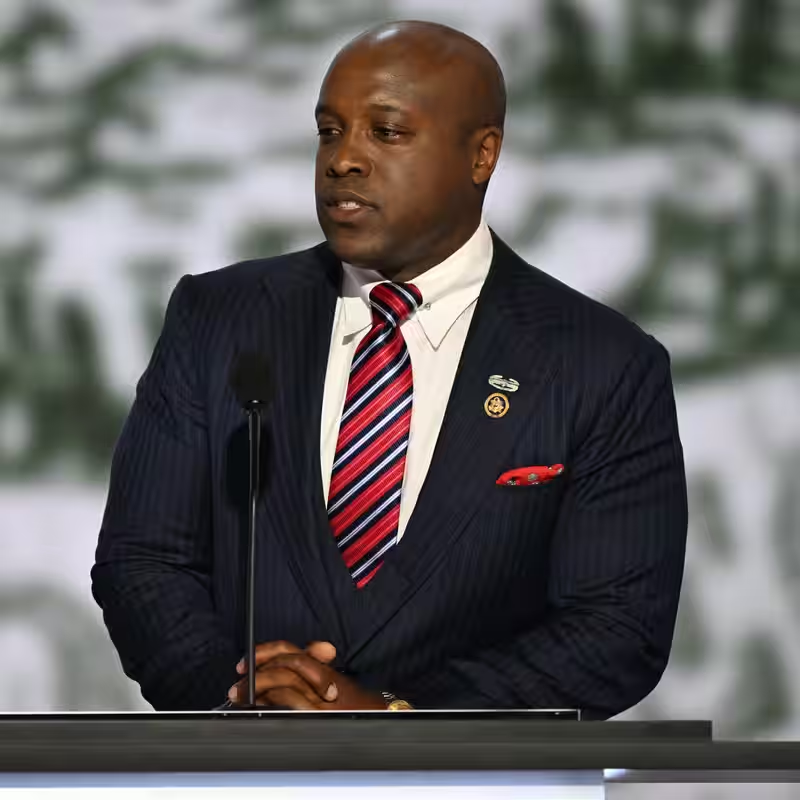In a move that’s sent shockwaves through Texas Republican circles, U.S. Representative Wesley Hunt officially entered the 2026 Senate race on Monday—throwing a wrench into an already volatile GOP primary battle between incumbent Senator John Cornyn and Attorney General Ken Paxton.
Table of Contents
- Wesley Hunt Enters the Race with a Bold Pitch
- Why Hunt Jumped In Now
- The Cornyn-Paxton Feud: A Toxic Backdrop
- Who’s Wesley Hunt Trying to Win Over?
- What This Means for Republicans Nationally
- Sources
Wesley Hunt Enters the Race with a Bold Pitch
Wesley Hunt, the 43-year-old freshman congressman from Houston and one of the first Black Republicans to represent Texas in the House, launched his Senate campaign with a three-minute biographical video highlighting his military service, conservative roots, and interracial marriage.
“The time is now,” Hunt declared on social media, framing his candidacy as a generational reset for Texas politics. “I’m going to be the one that’s going to put the priorities of Texans first—not engage in a blood feud.”
His entry instantly reshapes the Republican primary, which had already become a bitter, expensive showdown between Cornyn—a two-term senator and former Senate whip—and Paxton, the scandal-plagued but Trump-aligned attorney general who’s led in early polls.
Why Hunt Jumped In Now
Hunt had been teasing a run for months, waiting to see if Cornyn would falter under Paxton’s attacks. While Cornyn’s team has spent millions painting Paxton as ethically compromised—citing his 2023 impeachment trial and ongoing legal battles—Hunt argues neither man offers a forward-looking vision.
“They’re just slinging mud at each other,” Hunt told The New York Times. “Texans deserve better.”
He also signaled a sharp policy break with Cornyn by vowing to repeal the bipartisan gun safety law Cornyn helped pass after the Uvalde school shooting in 2022—a move clearly aimed at rallying the GOP base.
The Cornyn-Paxton Feud: A Toxic Backdrop
The existing primary was already one of the most expensive and acrimonious in the country. Paxton, backed by Trump loyalists and far-right donors, has branded Cornyn a “RINO” (Republican In Name Only). Cornyn, in turn, has called Paxton “unfit for office” and highlighted his indictment on securities fraud charges.
Now, Hunt’s entrance threatens to split the anti-Paxton vote—potentially clearing a path for the attorney general to win a plurality in a crowded field.
“No one is happier this morning than the national Democrats,” said Matt Mackowiak, a senior Cornyn adviser, reflecting widespread concern that Paxton would be easier for a Democrat to beat in the general election.
Who’s Wesley Hunt Trying to Win Over?
Hunt is targeting a specific slice of the GOP electorate: conservative voters who reject Paxton’s baggage but see Cornyn as out of touch. He’s also betting on his personal story—military veteran, West Point grad, husband and father—to appeal to younger and more diverse Republicans.
A late August poll from the Texas Politics Project found that 50% of Republican voters had no opinion of Hunt, suggesting both opportunity and risk. His campaign will need to rapidly build name recognition across a state of 30 million people.
Notably, Hunt doesn’t rule out a Paxton victory. “What we know about Ken Paxton is, he’s actually a conservative,” he said—implying Cornyn isn’t.
What This Means for Republicans Nationally
The National Republican Senatorial Committee (NRSC) is furious. The group, which has backed Cornyn, warned donors in September that a Hunt run would be a “vanity project that could cost Republicans control of the Senate.”
With Democrats favored to gain seats in the 2026 midterms, a protracted, divisive Texas primary could drain resources and energize Democratic turnout in a state that’s becoming increasingly competitive.
Paxton’s campaign, meanwhile, welcomed Hunt’s entry. “Wesley and General Paxton both know that Texans deserve better than the failed, anti-Trump record of John Cornyn,” said Paxton adviser Nick Maddux.
For Hunt, the stakes are high—but so is the potential reward. If successful, he’d become Texas’s first Black U.S. senator and a rising star in a party seeking to broaden its appeal.




